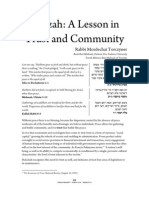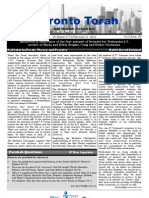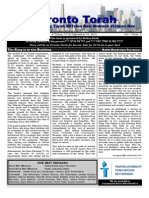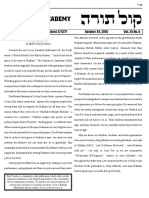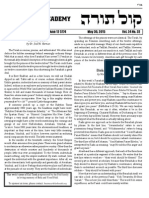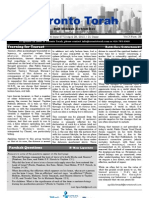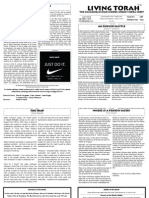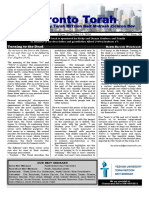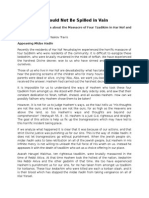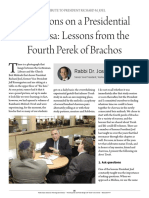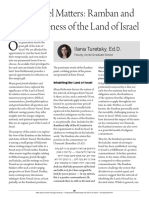Toronto Torah
Toronto Torah
Uploaded by
outdash2Copyright:
Available Formats
Toronto Torah
Toronto Torah
Uploaded by
outdash2Original Title
Copyright
Available Formats
Share this document
Did you find this document useful?
Is this content inappropriate?
Copyright:
Available Formats
Toronto Torah
Toronto Torah
Uploaded by
outdash2Copyright:
Available Formats
Toronto Torah
Beit Midrash Zichron Dov
Parshat Vayyera 15 Marcheshvan 5772/November 12, 2011
Vol.3 Num. 7
Mazal Tov to Gillit and Yair Manas on the birth of a baby girl! May she grow to Torah, Chuppah uMaasim Tovim!
Jews and Politics
The sage Shemayah was a leading scholar of the first century BCE and mentor of the great Hillel, but his words in Pirkei Avot 1:10 have gained little traction with Jews over the centuries. Shemayah advised, "Love labour, hate positions of authority and do not make yourself known to the government." Ignoring this judicious counsel, we strive for early retirement, we clamour for power, and we have a long, colourful history of cultivating relationships with the government du jour. Shemayah's own flouting of his first two pearls of wisdom is fascinating; he held the sinecure of President of the Sanhedrin, so that his advice amounts to, "Do as I say, not as I do." But to focus on his third recommendation, why did so many giants of our past Rabbi Yehudah haNasi, Mar Shemuel, Shemuel haNagid, Don Isaac Abarbanel, Sir Moses Montefiore, to name a few cultivate relationships with the governments of their day? On one level, our government alliances are simply a product of Pragmatism. We would like certain things from society: the right to practice our religion without being harrassed, the option of sending our children to Jewish schools, the freedom to take Shabbat and Yom Tov off of work without penalty. We would like certain ideals reflected in municipal and federal policy. A pragmatist says that if we want to achieve, we must involve ourselves, express our opinions, and contribute to the public good. We find this point of view expressed by Rabbi Yissachar Techtel, author of Em haBanim Smeichah, regarding Israel and the involvement of Torah-observant Jews in birthing the nascent state. Writing in 1942, Rav Techtel berated those who complained about the secular character of the Zionist leadership. He asked, Were you involved when they started? Did you build their towns with them? Did you move to the land and help build it up? We must be willing to be involved. A second reason for investment is Gratitude. We receive food through a system of highways, profit from a stable commercial environment, and live safely thanks to police. We enjoy parks in which to play, and roads on which to drive. Our taxes fund these services, but society provides the oversight, design and maintainenance. Gratitude dictates that we pay for this service, and playing a role in government is part of that payment. Rav Moshe Feinstein argued for gratitude in a 1984 letter: "A fundamental principle of Judaism is hakaras hatov recognizing benefits afforded us and giving expression to our appreciation. Therefore, it is incumbent upon each Jewish citizen to participate in the democratic system which affords us the freedoms we enjoy. The most fundamental responsibility incumbent upon each individual is to register to vote." Beyond pragmatism and gratitude, th ough, we tr adi ti onal ly fl out
R Mordechai Torczyner
Shemayah's advice because we are taught to invest in Community. We are a Jewish community, but we are also part of a larger community, and we are responsible to that larger community. As the gemara (Shabbat 33b) explains, Yaakov pioneered this approach. When Yaakov moved his family to Shechem, he contributed to the infrastructure of the land; Rav said that Yaakov established a currency, Shemuel said that Yaakov founded a marketplace, and R Yochanan said that he constructed bathhouses for the population. Rashi explains that Yaakov did this when he purchased land in the area; upon becoming landed, he made an investment in the public good. The same message may be seen in our ancestor Avraham's plea on behalf of the hypothetical righteous population of Sodom. Avraham contended, Perhaps there are righteous people b'toch ha'ir, in the midst of the city, emphasizing that the individuals who could forestall catastrophe would be people who functioned as part of the citizenry, not as an isolated enclave. The work Panim laTorah cites the Vilna Gaon as highlighting this language, and Ibn Ezra and Rav Shimshon Raphael Hirsch did likewise in their biblical commentaries. Our worth stems from our involvement with the greater populace. G i v e n t h e s e th r e e e l e m e n t s Pragmatism, Gratitude and Community why did Shemayah stand against entry into government? Perhaps Shemayah's words were formed in response to the Sanhedrin he personally led, a group of sages who cowered before the murderous King Herod (Josephus, Antiquities of the Jews 14:9; see also Sanhedrin 19a). Shemayah was justly concerned that a nation which consorted closely with corrupt kings could be intimidated or bought. Nonetheless, the weight of Jewish tradition is with the Abarbanels and Montefiores; for reasons both selfish and selfless, we seek the good of the land we inhabit investing, building, and governing as well. torczyner@torontotorah.com
Parshah Questions
R Meir Lipschitz
(Answers are available at http://bit.ly/uQZClD) How do we know who the two youths of Avraham are? (Rashi, Mizrachi, Gur Aryeh to Bereishit 22:3) What were the ten tests of Avraham? (Rashi, Rambam, and Rabbeinu Yonah to Avot 5:3) What lessons can be learned from the Akeidah? (Moreh HaNevuchim 3:24, Rabbeinu Bachaye Devarim 21:21 v'chol Yisrael, Abarbanel Bereishit 22:1, Hertz Chumash The Binding of Isaac (Akedah) ) For children: How do we know that welcoming guests is a great mitzvah? (Rashi Bereishit 18:2, Shevuos 35b, Shabbat 127a) meir.lipschitz@gmail.com
Laws of Shnayim Mikra
In addition to hearing the weekly Torah portion, adult men1 are required to read the weekly Torah portion (but not a Yom Tov reading or haftorah2) twice, and the Aramaic translation of Onkelos.3 This obligation, which seems to be rabbinic, applies irrespective of one's Torah knowledge; even one who spends all of his time learning advanced Torah must devote his time to this mitzvah.4 In place of the Aramaic translation of Onkelos, one may read Rashi's com m e n ta r y. 5 Auth or i t i e s d i ffe r concerning which is preferable; some6 prefer Onkelos, as it is endorsed by the Talmud, which dates an Aramaic translation by Onkelos the convert to the second Beit haMikdash.7 Others8 prefer Rashi, as his commentary is built on Talmudic thought and is more elaborate than that of Onkelos. Pious individuals are advised to read both.9 If choosing between the two, one should keep in mind that comprehension is of primary importance. There are three approaches as to how one may go through each Torah portion. (1) One reads through each parshah (i.e. paragraph; a section marked off by a or )twice, afterward reading Onkelos/Rashi for that section.10 (2) One reads each verse twice, followed by Onkelos/Rashi for that verse.11 (3) One reads through each parshah once, followed by each individual verse of that parshah with Onkelos/Rashi.12 One may choose any format. 1 3 Most authorities require one to read the Torah text twice before continuing to Onkelos/Rashi,14 but some prefer a reading of Onkelos/Rashi in between the two Torah readings.15 When using Rashi, those verses that have no commentary should be read a third time instead.16
R Ezra Goldschmiedt
Hitoriri: Jewish Spirituality
Each portion is to be read im hatzibbur, with the community. One is considered to be reading im hatzibbur from the time one prays Minchah on Shabbat17 until Minchah of the following Shabbat. Optimally, one should finish the weekly portion before the daytime kiddush to ensure that a lengthy meal won't prevent him from finishing on time.18 One who did not finish before Minchah should still complete the portion, as some authorities allow for it to be completed before the conclusion of Shabbat, or before the following Tuesday night, or before the new cycle of Torah readings are begun on Simchat Torah.19 The reading of VeZot HaBeracha is considered im hatzibbur until Parshat Bereishit is read on Simchat Torah morning, which is also when one may begin reading Bereishit for the next cycle.20
1 Shemirat Shabbat KeHilchatah 42:231 2 Shulchan Arukh, Orach Chaim 285:7 3 Shulchan Arukh, Orach Chaim 285:1 4 Teshuvot HaRashba 1:206 5 Shulchan Arukh, Orach Chaim 285:2 6 Arukh HaShulchan, Orach Chaim 285:12; Beur Halachah 235 s.v. Targum 7 Megilah 3a 8 Shulchan Arukh HaRav 285:2 9 Shulchan Arukh, Orach Chaim 285:2 10 Magen Avraham, Orach Chaim 285:1 11 Shulchan Arukh HaRav 285:3 12 Birur Halachah 285 13 Shulchan Arukh HaRav 285:3 14 Kaf HaChaim 285:6 15 Bikurei Chaim, Mekor Chaim 3:11 16 Mishnah Berurah 285:5 17 Shulchan Arukh, Orach Chaim 285:3; 18 Mishnah Berurah 285:7 19 Shulchan Arukh, Orach Chaim 285:4; Beur Halachah 285 s.v. Yashlim 20 Shulchan Arukh, Orach Chaim 285:4 Bikurei Chaim 2:18
The Fate of a Snake
Hillel Horovitz : : " ", " , . ? : ' : " ", ' . ' : " " , '. ' . , ' . , , . ' ' . ' .' : " ", . ? ! , ', ' .
613 Mitzvot: Mitzvah 112 Creating rest during the seventh year
R Mordechai Torczyner
Mitzvot 326 and 327 declare prohibitions against working the ground and trees of Israel every seventh year. Mitzvah 112 adds a mitzvat aseh, commanding us to actively create a state of rest for the land. The Rambam and Sefer haChinuch deduce this from Shemot 34:21, "You shall create shabbat from plowing and harvesting," while some deduce it from other passages. However: Why does the Torah need to specify that we shall neither plow nor harvest? We already know, "You shall not sow your field" (Vayikra 25:4)! Rabbi Akiva explains that this passage teaches us to extend the sanctity beyond the seventh year; we stop plowing long before the year begins, and afterward we do not harvest that which grew independently during that year. Rabbi Yishmael agrees with Rabbi Akiva's principle of extending the year's sanctity, but he deduces it by analogy from Yom Kippur, Shabbat and Yom Tov, all of which we extend beyond their strict start and finish. (Rosh haShanah 9a) torczyner@torontotorah.com
hhorovitz@torontotorah.com
Visit us at www.torontotorah.com
Biography: Rav Elyah Lopian
Torah in Translation
R Dovid Zirkind
HaAretz
Purity of Action
Rav Elyah Lopian Lev Eliyahu, pg. 60
Translated by R Dovid Zirkind
In each generation every person, from the youngest to the oldest with no exception, all pray each day without interruption, Purify our hearts to serve You in truth! This means the following: True worship of G-d is completely free of partiality and personal bias. Otherwise, one is not called a servant of G-d, but rather a servant of himself, and there would be no greater falsehoold than inserting worship of the self in place of worship of G-d. Where does personal bias originate? I would say it results from the material, physical nature of mans body, that he loves himself before all, and his sole interest for all twenty-four hours of the day without interruption is to sate the desires of his body and the yearnings of his heart. Consequently, in every thought, speech and action that man is involved in, even unintentionally his self-love and personal bias enters, and does not leave until he fights it and expels it with great strength. For this we pray even all the tzaddikim and chassidim in each generation Purify our hearts to serve you in truth! Because the purity of the heart is tainted by [even] the smallest amount of dirt the impurity of self-interest which is falsehood! The heart which is pure of interwoven lies is the one that merits to worship G-d in truth! There are precious stones and pearls in this world, and they are rare. However, parallel to them there are many stones and polished glasses that appear in the eyes of a novice like precious stones. One needs an expert to examine and understand that they are fake. There is also glass that is so polished and shiny that even the expert can mistake it for an expensive pearl, and so it is subjected to many tests to recognize its identity. The same is true of gold; there is a test to identify if it is a form of gold or not, and even if it is identified as gold we still must know if it is pure gold or if it contains impurities, and what percentage is gold, etc. Behold, this material requires many fundamental challenges, tests and examinations before it will be completely identified. The same is true with mans actions, because each action is preceded first by the thought process of the intellect and the emotions of the heart. Therefore, even if you see before you two people performing an identical action with no distinction between them, this is only in the action. At the core
Reb Elyah Lopian (1876-1970) was born in Grajewo, Poland where he received his religious education from the students of R Yisrael Salanter, the founder of the mussar movement. He emigrated to England in 1928, where he served as the Rosh Yeshiva of the Etz Chaim Yeshiva in London's East End. At the age of 74 he fulfilled his lifelong dream of moving to Israel. Upon his arrival R Lopian intended to devote himself to his personal studies, but due to the encouragement of the Chazon Ish he accepted a position as Mashgiach Ruchani (Spiritual Counsel) at the Kenesset Chizkiyahu Yeshiva in Zichron Yaakov. His discourses on the weekly parshah, known for their passionate mussar and astute psychological insights, were edited by his children and published after his death (see translation). One of many powerful stories of R Elyahs greatness was retold by his nephew, Rabbi Dovid Lapin: I recall so clearly only a few years before his passing, how he got up in the middle of a seder (study session) in the Yeshiva one evening and spontaneously started saying Kaddish. The whole Yeshiva stopped learning, stood and answered his soulwrenching Kaddish. No one knew what caused him to do this, and yet not a single person suggested it was the beginning of senility. We sensed we were witnessing one of those cosmic moments we would never understand. Several hours later the news came through that the Syrian Air Force shot down two Israeli fighter-jets, not very far from Kfar Hassidim. The pilots were killed. The time of the incident: exactly as Reb Elya was reciting Kaddish. dzirkind@torontotorah.com
which motivates action, namely the thought and heartfelt emotion, the gap between these people is quite possibly like the distance between east and west. The same is true within a single person, from one action to the next; it all depends on where the action stems from, if it is from the physical nature of his body and the will of his desires or from the holiness of his soul and the intellect of his heart
Tapuach
R Baruch Weintraub , ' ', ' ' . : , , 5 . : - - 5 , - . . ".. " ( : " , " ) : " .)' " (: ", - , . , , : ( ) , : " .) " ( , . '' ' ' " " " . ( ). 9 , , . , , . ' , ' , . . , , . , 575 . " "
bweintraub@torontotorah.com
Visit us at www.torontotorah.com
Schedule for November 12-18, 15-21 Marcheshvan
Tuesday, November 15 Shabbat November 12 1:30 PM R Mordechai Torczyner, Zecharyah: Measuring Jerusalem, for Mekorot, Shaarei Shomayim 1 hour before minchah Yair Manas, Gemara Sukkah, 7:15 PM R Ezra Goldschmiedt, Ramban on Parshah, BAYT Mizrachi Bayit 45 minutes before minchah R Mordechai Torczyner, Daf 8:00 PM Mrs. Elyssa Goldschmiedt, Malbim on Chumash, TCS, women Yomi, BAYT 8:00 PM Yair Manas: Minchat Chinuch, Clanton Park, men After minchah R Mordechai Torczyner, Gem. Avodah Zarah: Voluntary Martyrdom II, BAYT Wednesday, November 16 6:40 PM R Dovid Zirkind, Parent-Child Learning I: Angels 10:00 AM R Mordechai Torczyner, Dramas of Jewish History: on Earth, Shaarei Shomayim Building the Second Temple, BEBY, with Melton Sunday, November 13 12:30 PM R Mordechai Torczyner, Business Lunch and Learn at Zeifmans, Week 3 of 3: Holiday Parties & Presents 9:15 AM Hillel Horovitz, Parshah, Hebrew, Zichron Yisroel 8:30 PM R Baruch Weintraub, Rambam: Hilchot Melachim, 11:50 AM R Baruch Weintraub, Rambam: Hilchot Melachim, Or Chaim, collegiates Shomrai Shabbos, men After maariv R Dovid Zirkind, Bava Kama: Introduction to 8:45 PM R Dovid Zirkind, Gemara Beitzah chaburah, Shaarei Shomayim Avot Nezikin, Shaarei Shomayim 9:00 PM R Ezra Goldschmiedt, Ethical Questions for After maariv R Baruch Weintraub, Halachic issues in Superheroes, Week 2 of 6, BAYT Israel, Hebrew, Clanton Park, men Monday, November 14 8:00 PM R Mordechai Torczyner, Medical Halachah: Attending Conferences on Shabbat, Shaarei Shomayim ($5 for CME credit) 8:30 PM Hillel Horovitz, Siddur: In-depth, Clanton Park, men Thursday, November 17 9:15 AM R Mordechai Torczyner, Supernatural vs. Superstition, 36 Theodore in Thornhill, women, not this week Friday, November 18 8:00 AM R Dovid Zirkind, Friday Parsha Preview, Village Shul
We would like to thank koshertube.com for filming our shiurim!
Visit us at www.torontotorah.com
You might also like
- Gutnick-Steinmetz - Elul 1, 5774 - Yechidus of Rebbe With R. Chaim GutnickDocument36 pagesGutnick-Steinmetz - Elul 1, 5774 - Yechidus of Rebbe With R. Chaim GutnickYehudah DovBer ZirkindNo ratings yet
- Lessons Learned From Conversion: Rabbi Zvi RommDocument5 pagesLessons Learned From Conversion: Rabbi Zvi Rommoutdash2No ratings yet
- Likutei Ohr: A Publication of YULA Boys High SchoolDocument2 pagesLikutei Ohr: A Publication of YULA Boys High Schooloutdash2No ratings yet
- To Contemplate The Holy: 25 Adar I, 5776/march 5, 2016 Parshat Vayakhel Vol. 7 Num. 26Document4 pagesTo Contemplate The Holy: 25 Adar I, 5776/march 5, 2016 Parshat Vayakhel Vol. 7 Num. 26outdash2No ratings yet
- To Contemplate The Holy: 25 Adar I, 5776/march 5, 2016 Parshat Vayakhel/Shekalim Vol. 7 Num. 26Document4 pagesTo Contemplate The Holy: 25 Adar I, 5776/march 5, 2016 Parshat Vayakhel/Shekalim Vol. 7 Num. 26outdash2No ratings yet
- 889Document40 pages889B. MerkurNo ratings yet
- Toronto TorahDocument4 pagesToronto Torahoutdash2No ratings yet
- Matzah: A Lesson in Trust and Community: Rabbi Mordechai TorczynerDocument6 pagesMatzah: A Lesson in Trust and Community: Rabbi Mordechai Torczyneroutdash2No ratings yet
- Accept Advice! (Even From Your In-Laws) : 22 Shevat, 5777/february 18, 2017 Parshat Yitro Vol. 8 Num. 24Document4 pagesAccept Advice! (Even From Your In-Laws) : 22 Shevat, 5777/february 18, 2017 Parshat Yitro Vol. 8 Num. 24outdash2No ratings yet
- UntitledDocument4 pagesUntitledoutdash2No ratings yet
- Likutei Ohr: A Publication of YULA Boys High SchoolDocument2 pagesLikutei Ohr: A Publication of YULA Boys High Schooloutdash2No ratings yet
- TzavDocument2 pagesTzavLivingTorahNo ratings yet
- Parshas Parah and Why We Read It: by Ariel Sacknovitz, 11th GradeDocument6 pagesParshas Parah and Why We Read It: by Ariel Sacknovitz, 11th Gradeoutdash2No ratings yet
- Mikvah eDocument60 pagesMikvah eNana KoprivaNo ratings yet
- UntitledDocument4 pagesUntitledoutdash2No ratings yet
- Toronto TorahDocument4 pagesToronto Torahoutdash2No ratings yet
- Toronto TorahDocument4 pagesToronto Torahoutdash2No ratings yet
- The Goal of It AllDocument4 pagesThe Goal of It Alloutdash2No ratings yet
- Purifying The Past and Proceeding To The Promised LandDocument4 pagesPurifying The Past and Proceeding To The Promised Landoutdash2No ratings yet
- How To Become A Kingdom of PriestsDocument3 pagesHow To Become A Kingdom of Priestsoutdash2No ratings yet
- Toronto TorahDocument4 pagesToronto Torahoutdash2No ratings yet
- The King Is in The Building: This Issue Is Sponsored by Nathan Kirsh in Loving Memory of His Parents andDocument4 pagesThe King Is in The Building: This Issue Is Sponsored by Nathan Kirsh in Loving Memory of His Parents andoutdash2No ratings yet
- Toronto TorahDocument4 pagesToronto Torahoutdash2No ratings yet
- Finding Grace: Parashat Bereishit Tishrei 27 5777 October 29, 2016 Vol. 25 No. 6Document4 pagesFinding Grace: Parashat Bereishit Tishrei 27 5777 October 29, 2016 Vol. 25 No. 6outdash2No ratings yet
- Details Count: Parashat Naso Sivan 12 5774 May 30, 2015 Vol. 24 No. 32Document4 pagesDetails Count: Parashat Naso Sivan 12 5774 May 30, 2015 Vol. 24 No. 32outdash2No ratings yet
- Toronto TorahDocument4 pagesToronto Torahoutdash2No ratings yet
- Toronto TorahDocument4 pagesToronto Torahoutdash2No ratings yet
- Test ProjectDocument7 pagesTest ProjectEliana ApplebaumNo ratings yet
- The Posek: His Role and Responsibility: Judaica Press Complete Tanach)Document5 pagesThe Posek: His Role and Responsibility: Judaica Press Complete Tanach)outdash2No ratings yet
- Urim TumimDocument50 pagesUrim TumimPriscilajaege100% (1)
- VayeshevDocument2 pagesVayeshevLivingTorahNo ratings yet
- Toronto TorahDocument4 pagesToronto Torahoutdash2No ratings yet
- Toronto TorahDocument4 pagesToronto Torahoutdash2No ratings yet
- The Ultimate Sacrifice: 18 Cheshvan, 5776/october 31, 2015 Parshat Vayera Vol. 7 Num. 8Document4 pagesThe Ultimate Sacrifice: 18 Cheshvan, 5776/october 31, 2015 Parshat Vayera Vol. 7 Num. 8outdash2No ratings yet
- Being Wise of Heart: Volume XIII - Issue 11 The DRS Weekly Torah PublicationDocument8 pagesBeing Wise of Heart: Volume XIII - Issue 11 The DRS Weekly Torah Publicationoutdash2No ratings yet
- Turning To The DeadDocument4 pagesTurning To The Deadoutdash2No ratings yet
- Chicago: TorahDocument8 pagesChicago: Torahoutdash2No ratings yet
- The Eternal Message of The Urim and ThumimDocument4 pagesThe Eternal Message of The Urim and Thumimoutdash2No ratings yet
- Maintaining Peace of Mind in A High-Speed World: Rabbi Moshe Tzvi WeinbergDocument11 pagesMaintaining Peace of Mind in A High-Speed World: Rabbi Moshe Tzvi Weinbergoutdash2No ratings yet
- Yutorah Print: Shelach 5774Document8 pagesYutorah Print: Shelach 5774outdash2No ratings yet
- Rabbinic Authority Versus The Historical PDFDocument35 pagesRabbinic Authority Versus The Historical PDFRichard RadavichNo ratings yet
- Four Kedoshoim - Rav Moshe Sternbuch 3Document7 pagesFour Kedoshoim - Rav Moshe Sternbuch 3api-271777817No ratings yet
- Megillat Esther, Then Matan Torah: Parashat Tzav Adar II 16 5776 March 26, 2016 Vol. 25 No. 26Document4 pagesMegillat Esther, Then Matan Torah: Parashat Tzav Adar II 16 5776 March 26, 2016 Vol. 25 No. 26outdash2No ratings yet
- Toronto TorahDocument4 pagesToronto Torahoutdash2No ratings yet
- UntitledDocument4 pagesUntitledoutdash2No ratings yet
- In Search of A Non-Liberal Humanism: 3 Tammuz, 5775/june 20, 2015 Parshat Korach Vol. 6 Num. 37Document4 pagesIn Search of A Non-Liberal Humanism: 3 Tammuz, 5775/june 20, 2015 Parshat Korach Vol. 6 Num. 37outdash2No ratings yet
- Toronto TorahDocument4 pagesToronto Torahoutdash2No ratings yet
- Featured Articles Weekly ColumnsDocument40 pagesFeatured Articles Weekly ColumnsB. MerkurNo ratings yet
- UntitledDocument20 pagesUntitledoutdash2No ratings yet
- 5771 Yk AmDocument8 pages5771 Yk AmGary M. Bretton-GranatoorNo ratings yet
- Toronto TorahDocument4 pagesToronto Torahoutdash2No ratings yet
- UntitledDocument2 pagesUntitledoutdash2No ratings yet
- Toronto TorahDocument4 pagesToronto Torahoutdash2No ratings yet
- Toronto TorahDocument4 pagesToronto Torahoutdash2No ratings yet
- A Halakhic View of Natural LawDocument13 pagesA Halakhic View of Natural Lawאליעזר קופערNo ratings yet
- Parasha VayikraDocument8 pagesParasha Vayikramanemoj82No ratings yet
- Source SheetDocument27 pagesSource SheetEmma Isabel CesaNo ratings yet
- Likutei Ohr: A Publication of YULA Boys High SchoolDocument2 pagesLikutei Ohr: A Publication of YULA Boys High Schooloutdash2No ratings yet
- VaeirahDocument2 pagesVaeirahLivingTorahNo ratings yet
- Chavrusa: Chag Hasemikhah ז"עשתDocument28 pagesChavrusa: Chag Hasemikhah ז"עשתoutdash2No ratings yet
- Reflections On A Presidential Chavrusa: Lessons From The Fourth Perek of BrachosDocument3 pagesReflections On A Presidential Chavrusa: Lessons From The Fourth Perek of Brachosoutdash2No ratings yet
- Parashas Beha'aloscha: 16 Sivan 5777Document4 pagesParashas Beha'aloscha: 16 Sivan 5777outdash2No ratings yet
- UntitledDocument12 pagesUntitledoutdash2No ratings yet
- 879510Document14 pages879510outdash2No ratings yet
- UntitledDocument12 pagesUntitledoutdash2No ratings yet
- The Matan Torah Narrative and Its Leadership Lessons: Dr. Penny JoelDocument2 pagesThe Matan Torah Narrative and Its Leadership Lessons: Dr. Penny Joeloutdash2No ratings yet
- Consent and Coercion at Sinai: Rabbi Dr. Jacob J. SchacterDocument3 pagesConsent and Coercion at Sinai: Rabbi Dr. Jacob J. Schacteroutdash2No ratings yet
- The Meaning of The Menorah: Complete Tanach)Document4 pagesThe Meaning of The Menorah: Complete Tanach)outdash2No ratings yet
- The Surrogate Challenge: Rabbi Eli BelizonDocument3 pagesThe Surrogate Challenge: Rabbi Eli Belizonoutdash2No ratings yet
- Experiencing The Silence of Sinai: Rabbi Menachem PennerDocument3 pagesExperiencing The Silence of Sinai: Rabbi Menachem Penneroutdash2No ratings yet
- Flowers and Trees in Shul On Shavuot: Rabbi Ezra SchwartzDocument2 pagesFlowers and Trees in Shul On Shavuot: Rabbi Ezra Schwartzoutdash2No ratings yet
- Performance of Mitzvos by Conversion Candidates: Rabbi Michoel ZylbermanDocument6 pagesPerformance of Mitzvos by Conversion Candidates: Rabbi Michoel Zylbermanoutdash2No ratings yet
- What Happens in Heaven... Stays in Heaven: Rabbi Dr. Avery JoelDocument3 pagesWhat Happens in Heaven... Stays in Heaven: Rabbi Dr. Avery Joeloutdash2No ratings yet
- Chag Hasemikhah Remarks, 5777: President Richard M. JoelDocument2 pagesChag Hasemikhah Remarks, 5777: President Richard M. Joeloutdash2No ratings yet
- Shavuot To-Go - 5777 Mrs Schechter - Qq4422a83lDocument2 pagesShavuot To-Go - 5777 Mrs Schechter - Qq4422a83loutdash2No ratings yet
- Kabbalat Hatorah:A Tribute To President Richard & Dr. Esther JoelDocument2 pagesKabbalat Hatorah:A Tribute To President Richard & Dr. Esther Joeloutdash2No ratings yet
- I Just Want To Drink My Tea: Mrs. Leah NagarpowersDocument2 pagesI Just Want To Drink My Tea: Mrs. Leah Nagarpowersoutdash2No ratings yet
- Yom Hamyeuchas: Rabbi Dr. Hillel DavisDocument1 pageYom Hamyeuchas: Rabbi Dr. Hillel Davisoutdash2No ratings yet
- The Power of Obligation: Joshua BlauDocument3 pagesThe Power of Obligation: Joshua Blauoutdash2No ratings yet
- Lessons From Mount Sinai:: The Interplay Between Halacha and Humanity in The Gerus ProcessDocument3 pagesLessons From Mount Sinai:: The Interplay Between Halacha and Humanity in The Gerus Processoutdash2No ratings yet
- Why Israel Matters: Ramban and The Uniqueness of The Land of IsraelDocument5 pagesWhy Israel Matters: Ramban and The Uniqueness of The Land of Israeloutdash2No ratings yet
- Torah To-Go: President Richard M. JoelDocument52 pagesTorah To-Go: President Richard M. Joeloutdash2No ratings yet
- José Faur: Modern Judaism, Vol. 12, No. 1. (Feb., 1992), Pp. 23-37Document16 pagesJosé Faur: Modern Judaism, Vol. 12, No. 1. (Feb., 1992), Pp. 23-37outdash2No ratings yet
- 879446Document5 pages879446outdash2No ratings yet
- A Blessed Life: Rabbi Yehoshua FassDocument3 pagesA Blessed Life: Rabbi Yehoshua Fassoutdash2No ratings yet
- Nasso: To Receive Via Email VisitDocument1 pageNasso: To Receive Via Email Visitoutdash2No ratings yet
- Appreciating Moses' GreatnessDocument4 pagesAppreciating Moses' Greatnessoutdash2No ratings yet
- Chavrusa: Chag Hasemikhah ז"עשתDocument28 pagesChavrusa: Chag Hasemikhah ז"עשתoutdash2No ratings yet







